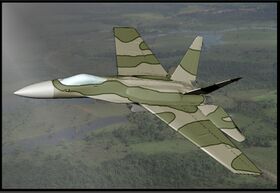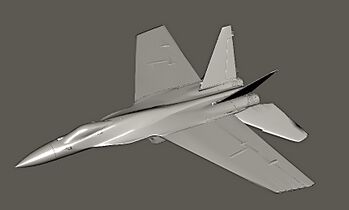Amérifighter EF-20: Difference between revisions
ContraViper (talk | contribs) |
ContraViper (talk | contribs) |
||
| (6 intermediate revisions by the same user not shown) | |||
| Line 8: | Line 8: | ||
{{flag|Gran Cuscatlan}}<br /> | {{flag|Gran Cuscatlan}}<br /> | ||
{{flagicon|Langenia}} [https://www.nationstates.net/nation=langenia/detail=factbook/id=1406167 Langenia] | {{flagicon|Langenia}} [https://www.nationstates.net/nation=langenia/detail=factbook/id=1406167 Langenia] | ||
|manufacturer = {{flagicon|Inyursta}} Incorporaçion Estavez- | |manufacturer = {{flagicon|Inyursta}} Incorporaçion Estavez-Kílo (IEK)<br /> | ||
{{flagicon|Gran Cuscatlan}} Industrias Sobberias <br /> | {{flagicon|Gran Cuscatlan}} Industrias Sobberias <br /> | ||
{{flagicon|Langenia}} Aeroespacial Acevedo-Chavez | {{flagicon|Langenia}} Aeroespacial Acevedo-Chavez | ||
| Line 33: | Line 33: | ||
In 1998, Cuscatlani officials were brought in on the project as well, seeking a replacement for their own EF-10 Condor multirole fighters. Industrias Sobberias designed and provided the multi-purpose MATADOR radar for the aircraft. They also proposed the idea of making the aircraft an export fighter. | In 1998, Cuscatlani officials were brought in on the project as well, seeking a replacement for their own EF-10 Condor multirole fighters. Industrias Sobberias designed and provided the multi-purpose MATADOR radar for the aircraft. They also proposed the idea of making the aircraft an export fighter. | ||
Aerospace Acedvedo-Chavez, a Langenian aerospace firm, was later permitted to produce the EF-20 domestically and assist with trial flights. | Aerospace Acedvedo-Chavez, a Langenian aerospace firm, was later permitted to produce the EF-20 domestically and assist with trial flights. | ||
===Development of Carrier-Based Capabilities=== | |||
Because the Inyurstan Navy was the initial interested parties, the EF-20 was built first as a carrier-capable fighter. Only once the capabilities desired by the Inyurstan Navy had been achieved, was a solid-wing and hookless variant built and moved forward with. By "working backwards" the designers were able to retain >80% parts commonality between the two variants. | |||
==Design== | ==Design== | ||
| Line 40: | Line 43: | ||
===Avionics=== | ===Avionics=== | ||
The Cuscatlani MATADOR radar is a multimode | The Cuscatlani MATADOR radar is a multimode Active Electronically Scanned Array (AESA) capable of detecting 1m<sup>2</sup> airborne targets at around 190km in a 45<sup>o</sup> search arc with the capability to adjust beam/search arc width. A secondary chin-mounted Inyurstan AEQ/GS-2 is applied for detection of moving ground and seaborne targets, but is also capable of surveillance, targeting, RFI cued, terrain profiling. It is also equipped with the [[CAT EYE IRST|CAT EYE infra-red search & track (IRST)]] for passive targeting and tracking of both aerial and surface targets. | ||
Both SEAD and self-defense capabilities are provided by the [[Sevât-M Counter-Emissions System]] capable of identifying, locating and targeting enemy emissions sources at long distances; as well as integration and automatic control of the [[LIDACS-III Counter-Measure Suite]]. | Both SEAD and self-defense capabilities are provided by the [[Sevât-M Counter-Emissions System]] capable of identifying, locating and targeting enemy emissions sources at long distances; as well as integration and automatic control of the [[LIDACS-III Counter-Measure Suite]]. | ||
| Line 58: | Line 61: | ||
===Carrier-Capable=== | ===Carrier-Capable=== | ||
'''EF-20S1:''' Naval variant with folding wings and tail hook. Single seat.<br /> | *'''EF-20S1:''' Naval variant with folding wings and tail hook. Single seat.<br /> | ||
'''EF-20S2:''' Naval variant with two-seats.<br /> | **Designated "'''AC/A-20S1 Crotalea Marina'''" in Inyurstan Navy service. | ||
'''EF-20S-C1:''' Naval single-seat variant without conformal fuel tanks.<br /> | *'''EF-20S2:''' Naval variant with two-seats.<br /> | ||
<br /> | *'''EF-20S-C1:''' Naval single-seat variant without conformal fuel tanks.<br /> | ||
** '''AC-20S2 Hydrophína:''' EF-20S-C1 in Inyurstan Navy service. Includes CAT-EYE I IRST, and functions similar to a "navalized Taipan"<br /> | |||
===Other=== | ===Other=== | ||
'''EE-20E2:''' Two-seat EW variant<br /> | '''EE-20E2:''' Two-seat EW variant<br /> | ||
Latest revision as of 02:10, 28 January 2024
| Amérifighter EF-20 Cascabel | |
|---|---|
 AC/A-20 in Inyurstan Jungle/Grassland camo | |
| General information | |
| Type | Heavy Strike Fighter |
| Manufacturer | |
| Status | In service |
| History | |
| Manufactured | 2001-present |
| Introduction date | 2003 |
The Amérifighter EF-20 Cascabel, also called the "AC/A-20 Crotaléa" in Inyursta (both meaning "Rattlesnake" in English), is a 4th Generation strike fighter developed primarily by Inyursta, Gran Cuscatlan and Langenia. It is intended to serve as both a deep-strike penetrator and capable air-to-air combatant, with a wide variety of compatible weapons and software to give it a versatile edge on the battlefield.
Development
Research and development on the EF-20 began after the lighter air-superiority fighter the AC-88 Taipan had already entered service with the Inyurstan Air Force. Like the F-15, the AC-88 was designed with complete air-to-air combat in mind, and followed the logic of "not a pound for air-to-ground". Inyurstan military designers began conceptualizing a heavy strike strike fighter based on the Taipan.
In 1998, Cuscatlani officials were brought in on the project as well, seeking a replacement for their own EF-10 Condor multirole fighters. Industrias Sobberias designed and provided the multi-purpose MATADOR radar for the aircraft. They also proposed the idea of making the aircraft an export fighter. Aerospace Acedvedo-Chavez, a Langenian aerospace firm, was later permitted to produce the EF-20 domestically and assist with trial flights.
Development of Carrier-Based Capabilities
Because the Inyurstan Navy was the initial interested parties, the EF-20 was built first as a carrier-capable fighter. Only once the capabilities desired by the Inyurstan Navy had been achieved, was a solid-wing and hookless variant built and moved forward with. By "working backwards" the designers were able to retain >80% parts commonality between the two variants.
Design
Body
At it's core, the EF-20 uses the same main frame as the AC-88, but externally the canards have been removed and the single-fin replaced with a double-fin conformation. The total surface of the wings have been increased to allow for heavier loading at the cost of more drag at high speeds. Powering the EF-20 are domestically (Inyurstan & Cuscatlani) produced copies of the Nihonese Kojima K50 engines - an advanced series of multimode engines adapted for air-to-air combat. In theory, they allow the EF-20 to achieve supercruise; however, supercruise has not been tested nor is it advised due to the heavier airframe.
Avionics
The Cuscatlani MATADOR radar is a multimode Active Electronically Scanned Array (AESA) capable of detecting 1m2 airborne targets at around 190km in a 45o search arc with the capability to adjust beam/search arc width. A secondary chin-mounted Inyurstan AEQ/GS-2 is applied for detection of moving ground and seaborne targets, but is also capable of surveillance, targeting, RFI cued, terrain profiling. It is also equipped with the CAT EYE infra-red search & track (IRST) for passive targeting and tracking of both aerial and surface targets.
Both SEAD and self-defense capabilities are provided by the Sevât-M Counter-Emissions System capable of identifying, locating and targeting enemy emissions sources at long distances; as well as integration and automatic control of the LIDACS-III Counter-Measure Suite.
Armament
In place of the AC-88's lower-caliber, higher rate-of-fire 23mm "Venom" cannon; the Amérifighter is equipped with twin 27mm RK-27 "Warlord" autocannons, with a 1,100RPM per barrel allowing for a combined 2,000RPM+.
The EF-20 boasts an extremely diverse array of compatible missile, bomb and rocket systems.
Variants
Standard Variants
EF-20A Standard, 1-seat variant
EF-20B Two-seat variant
EF-20C1: Single-seat variant without conformal fuel tanks for increased aerodynamics.
EF-20C2: Two-seat variant without conformal fuel tanks.
Carrier-Capable
- EF-20S1: Naval variant with folding wings and tail hook. Single seat.
- Designated "AC/A-20S1 Crotalea Marina" in Inyurstan Navy service.
- EF-20S2: Naval variant with two-seats.
- EF-20S-C1: Naval single-seat variant without conformal fuel tanks.
- AC-20S2 Hydrophína: EF-20S-C1 in Inyurstan Navy service. Includes CAT-EYE I IRST, and functions similar to a "navalized Taipan"
- AC-20S2 Hydrophína: EF-20S-C1 in Inyurstan Navy service. Includes CAT-EYE I IRST, and functions similar to a "navalized Taipan"
Other
EE-20E2: Two-seat EW variant
EX-20 PEO: (Plata D'Ordinance Éxperímental) Used by Inyursta for air-launched weapons testing.
Specifications
Performance
Crew: 1-2
Speed: Mach 2.1 (mph; km/h)
Combat Radius: 1,550km
- Combat Radius (C-variants): 1,200km
Range: >3,500km
Max Climb Rate: 14630 m/min - 49,000 ft/min
- Max Climb Rate(C-variants): 15,850 m/min - 52,000 ft/min
Empty Weight: 38,500lb; 17,500kg (1.3 T/W)
- Empty Weight (C-variants): 37,000lb; 16,800kg (1.36 T/W)
Gross Weight: 68,000lb; 30,800kg Internal fuel + 10 missiles (0.74 T/W)
- Gross Weight (C-variants): 62,000lb; 28,100kg Internal fuel + 10 missiles (0.8 T/W)
Max Takeoff Weight: 81,500lb; 37,000kg (0.62 T/W)
- Max Takeoff Weight (C-variants): 75,000lb; 34,300kg (0.67 T/W)
Internal Fuel Capacity: 25,400lbs; 11,500kg (approx 4,160gal)
- Internal Fuel Capacity (C-variants): 19,600lbs; 8,900kg (approx 3,115gal)
Armament
Hardpoints:
- x3 Undercarriage
- x8 Underwing
Gun: x2 RK-27 "Warlord" 27mm autocannon
| Air-to-Air | Air-to-Ground | Anti-Radiation | Anti-Ship |
|---|---|---|---|
| C-120 Rapier | ASM-7 STRIKE | OCE-1 Chaos | ASM-4 Leviathan |
| C-170 Rapier II | AGM-65 Maverick | OCE-3 Entropéa | ASM-8 Barracuda |
| C-80 Stilétto | AGM-84H/K SLAM-ER | AGM-88 HARM | AGM-158C LRASM |
| C-12 Éscouta | RY Rocket Family | AGM-84 Harpoon | |
| Python Family | CB Bomb Family | YU-7 Evening Tide | |
| MAA-1 | CBU-S Torencón | ||
| SJJ-9 Kouwayzar | AGM-130 | ||
| SJJ-10 Muthnib | AGM-158 JASSM | ||
| SJJ-11 Saiha | AGM-154 JSOW | ||
| AIM-120 AMRAAM | |||
| AIM-9 Sabre SRAAM |
